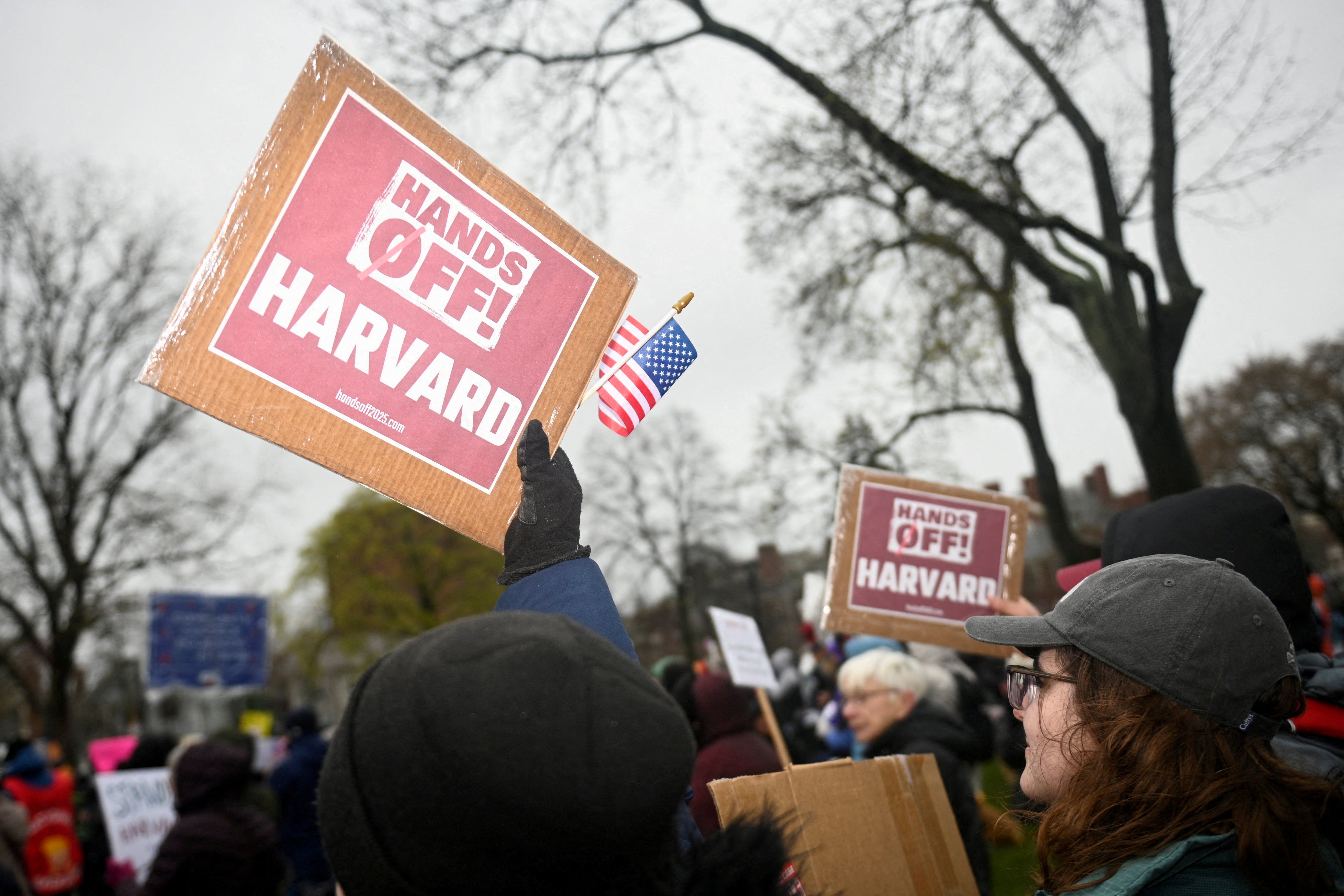This week, the oldest (and richest) American educational institution did what one of its peers could not: it defied the Trump administration.
Harvard’s president Alan Garber issued a defiant statement on Monday stating that the university wouldn’t accept a list of demands from the Trump administration he said amounted to a federal takeover of the institution.
Just as with other universities, the Trump administration demanded the university cooperate with federal agencies engaged in prosecuting and, in the case of foreign-born students, targeting for deportation, college students who engaged in a broad range of activities in opposition to the Israeli government’s siege of Gaza. It also would have forced Harvard to end diversity-based hiring policies.
A letter sent to the government in response was itself filled with subtle jabs. It was signed by two familiar faces: Robert Hur, the former Justice Department attorney who oversaw the probe of Joe Biden’s handling of classified materials, and William Burck, outside ethics counsel for the Trump Organization.
Further, the pair wrote that “[n]either Harvard nor any other private university can allow itself to be taken over by the federal government” — a remark that could clearly be seen as disapprovingly commenting on Ivy League member Columbia University to accept the sweeping policy changes demanded by the White House.
“No government — regardless of which party is in power — should dictate what private universities can teach,” wrote Harvard’s president.
So far, Harvard is unmoved in the face of the Trump administration’s retribution: roughly $2.2bn in various grant cuts affecting the university.

A host of other colleges and associations took another step on Tuesday and filed suit against the US Department of Energy aimed at halting DOGE-led grant cuts. The group includes the Massachusetts Institute of Technology (MIT) and Brown University, and wrote in court filings that the implemented cuts to research funding would be “devastating”. Students across the country have reported the reversals of graduate school admissions and research program acceptances in the wake of cuts to a host of federal agencies.
The framework of resistance is beginning to form. And one of the biggest names in Democratic politics is throwing himself behind it.
Barack Obama, the last Democratic president to be re-elected, backed up his alma mater on Twitter: “Harvard has set an example for other higher-ed institutions – rejecting an unlawful and ham-handed attempt to stifle academic freedom, while taking concrete steps to make sure all students at Harvard can benefit from an environment of intellectual inquiry, rigorous debate and mutual respect.“
“Let’s hope other institutions follow suit,” he added.
Obama, who was one of the highest-profile figures to emerge and pressure Joe Biden to step down from the Democratic ticket in 2024, remains one of the Democratic Party’s most influential voices. His statement is likely to be a rallying cry for a party which poll after poll (and FEC report after FEC report) indicate that voters believe is not energetic enough to build that resistance.
He also emerged from the 2024 election looking far more prescient than his onetime running mate, who most insiders now agree was encased in a tightly-contained sphere of advisers and close family members who, throughout the election season, shielded the president from signs of his growing unpopularity.
But he’s not the only Democrat finding a voice as the party considers what “Resistance 2.0” looks like, nor is he arguably the most effective. The progressive wing of the Democratic Party seems to have shaken off much of the post-election malaise affecting all corners of their coalition’s big tent. Now, its members are hammering Republicans in their home districts across the country.
Out west, Rep. Alexandria Ocasio-Cortez is now at the side of Senator Bernie Sanders as the two lefty icons hit red state after red state, drawing staggering crowds day after day. On Monday evening, the pair were in Nampa, Idaho, turning out a crowd which some estimates (including stand-by seating) ranged upwards of 15,000. The “Squad” member isn’t just getting her voice out — she’s building a political machine of her own, and on Tuesday reported a jaw-dropping amount of donations for the first quarter of 2025 — more than $9.6m.

In the east, John Fetterman’s old rival Conor Lamb continues to stir up what former Rep John Lewis would probably call “good trouble” in Pennsylvania. The former congressman headlined an empty-chair town hall event in a GOP-held district outside of Penn State University in March and is set to do it again on Wednesday. This time, he’s doing it in Pittsburgh — Fetterman’s backyard — and calling the senator out directly.
“Looking forward to this on Wednesday,” wrote Lamb on Twitter on Monday. “Maybe our senators – who both live within a few minutes’ drive of this event – will come explain recent votes, and address what they plan to do about Trump’s economic downturn and his defiance of the Supreme Court.”
With new polls coming out showing Donald Trump’s approval taking a serious slide in the face of economic instability brought on by his on-again-off-again tariff plan, Democrats may finally be finding their footing. Will they do anything with it?



